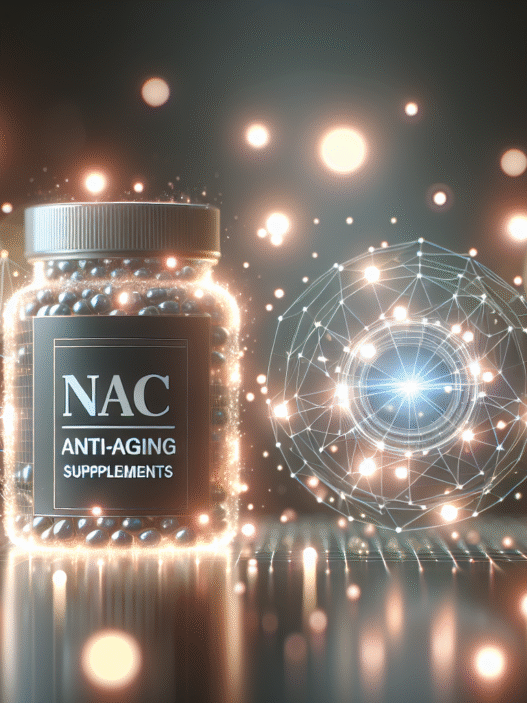Understanding N-Acetyl Cysteine (NAC)
Introduction to NAC
N-Acetyl Cysteine (NAC) is a derivative of the amino acid cysteine. It is commonly recognized for its ability to support health in various ways, particularly through its potential benefits in detoxification and antioxidant production. NAC is an important supplement for individuals concerned about liver health or those seeking longevity solutions.
NAC plays a significant role in the body by replenishing levels of a crucial antioxidant, glutathione. Glutathione is vital for combating oxidative stress, which is linked to aging and numerous health conditions. As such, many people interested in N-acetyl cysteine anti-aging properties may benefit from its inclusion in their health regimen.
Role of NAC in Antioxidant Production
NAC is primarily valued for its role in enhancing antioxidant production. It works alongside other amino acids, such as glutamine and glycine, to synthesize and replenish glutathione. This powerful antioxidant is essential for reducing oxidative damage and supporting overall cellular health. Research has shown that adequate antioxidant intake can lower the risk of several chronic conditions, including cardiovascular diseases.
The effectiveness of NAC as an antioxidant stems from its ability to boost intracellular concentrations of glutathione (GSH). This increment is crucial for maintaining cellular redox balance, which is relevant for managing diseases associated with oxidative stress and inflammation (PubMed Central). Consequently, individuals exploring the health benefits of NAC are often looking into its potential to support detoxification processes and reduce the effects of aging.
Overall, incorporating NAC into a health supplement routine may not only be beneficial for maintaining liver health but also for enhancing longevity by mitigating the effects of oxidative stress on the body. For a deeper understanding of how NAC contributes to health, explore more about n-acetyl cysteine benefits.
Benefits of NAC for Health
N-Acetyl Cysteine (NAC) offers a range of health benefits that extend to protecting vital organs, supporting mental health, improving respiratory function, and enhancing fertility. This section explores these benefits in detail.
Liver and Kidney Protection
NAC is known for its protective effects on the liver and kidneys. It helps prevent or reduce damage to these organs and is widely used to treat acetaminophen overdoses. The antioxidant and anti-inflammatory properties of NAC contribute to its effectiveness in managing various liver diseases.
In clinical settings, NAC has proven beneficial in conditions that affect liver and kidney health, making it a valuable supplement for those monitoring their organ function.
| Organ | NAC Benefits |
|---|---|
| Liver | Prevents liver damage, treats acetaminophen overdose |
| Kidneys | Reduces kidney damage and supports general kidney function |
Mental Health Conditions
NAC has emerged as a potential therapeutic agent for several mental health conditions, including bipolar disorder, schizophrenia, obsessive-compulsive disorder (OCD), and substance use disorders. Research indicates that NAC may decrease symptoms and enhance the quality of life for individuals with bipolar disorder and depression. Additionally, it plays a role in treating moderate to severe OCD (Healthline).
| Condition | NAC Effects |
|---|---|
| Bipolar Disorder | Decreases symptoms and improves quality of life |
| OCD | Aids in treatment of moderate to severe symptoms |
| Depression | Enhances emotional regulation |
Respiratory Health Improvement
NAC supports respiratory health by acting as an antioxidant and expectorant. It helps alleviate symptoms of various respiratory conditions, including chronic obstructive pulmonary disease (COPD), cystic fibrosis, asthma, and pulmonary fibrosis. NAC aids in improving lung function, minimizing exacerbations, and addressing symptoms of nasal and sinus congestion.
| Condition | NAC Benefits |
|---|---|
| COPD | Reduces symptoms and exacerbations |
| Asthma | Improves respiratory function |
| Cystic Fibrosis | Supports mucus clearance |
Fertility Enhancement
NAC may also enhance fertility in both men and women. In men, it can improve fertility outcomes in cases of varicocele, while in women, it assists those with polycystic ovary syndrome (PCOS) by inducing or augmenting the ovulation cycle. These benefits indicate the potential of NAC in supporting reproductive health.
| Gender | NAC Effects |
|---|---|
| Men | Improves fertility with varicocele |
| Women | Assists with ovulation in PCOS |
The multifaceted health benefits of N-Acetyl Cysteine highlight its significance as a supplement. Those interested in exploring additional advantages can refer to articles on n-acetyl cysteine benefits and nac supplement benefits.
NAC and Anti-aging Properties
N-acetyl cysteine (NAC) has been recognized for its potential anti-aging properties, primarily due to its ability to function as an antioxidant and its role in reducing oxidative stress. This section outlines how NAC contributes to longevity and overall health.
Antioxidant Effects of NAC
NAC possesses strong antioxidant properties. It assists the body in producing glutathione, one of the most powerful antioxidants, which plays a crucial role in eliminating harmful free radicals. These free radicals contribute to oxidative stress, which is associated with various health issues, including heart disease and diabetes.
The following table summarizes the relationship between NAC, glutathione production, and health benefits:
| Property | Effect |
|---|---|
| Antioxidant Production | Increases intracellular glutathione levels |
| Free Radical Reduction | Neutralizes harmful free radicals |
| Health Risk Mitigation | Lowers risks of chronic diseases |
Anti-aging Effects on Health Conditions
NAC has been linked to improvements in various health conditions that can show signs of aging. Studies reveal that it may enhance fertility in both men and women and contribute to healthier respiratory systems. Specifically, high doses of NAC (1,200 milligrams per day) are shown to reduce inflammation and oxidative damage in those with conditions like cystic fibrosis. This anti-inflammatory effect supports overall health, potentially delaying aging-related decline.
| Health Condition | NAC Impact |
|---|---|
| Infertility | Improved ovulation and sperm quality |
| Respiratory Illness | Reduced oxidative damage in lung tissue |
| Inflammation | Lowered inflammation levels |
Role in Oxidative Stress Reduction
The primary mechanism by which NAC demonstrates its anti-aging properties is through its role in combating oxidative stress. By increasing the levels of glutathione, NAC helps to maintain cellular redox balance, which is essential for preventing cellular damage that can lead to degenerative diseases (PubMed Central).
As oxidative stress plays a significant role in the aging process and the development of age-related diseases, NAC’s contribution to reducing this stress is a vital consideration for anyone focused on longevity and overall health.
For further information on how NAC supports the body in various ways, including its antioxidant effects, visit our articles on n-acetyl cysteine benefits and nac supplement benefits.
Therapeutic Effects of NAC
N-Acetyl Cysteine (NAC) is more than just a supplement with antioxidant benefits; it plays a significant role in promoting overall health. Its effects on cellular protection, heart disease prevention, and obesity management make it a valuable addition to any health regimen.
Cellular Protection and Glutathione Replenishment
NAC is essential for the production of glutathione, one of the body’s most crucial antioxidants. Glutathione helps protect cells from oxidative stress and plays a vital role in detoxification processes. NAC’s antioxidant properties, along with its capability to replenish glutathione levels, contribute significantly to cellular protection.
Research indicates that maintaining optimal levels of glutathione can help reduce the risk of several chronic conditions, including cardiovascular disease. With NAC’s ability to enhance glutathione concentrations, individuals may experience improved cellular health, thereby reducing the risk of oxidative-related damage n-acetyl cysteine benefits.
Contribution to Heart Disease Prevention
NAC’s antioxidant and anti-inflammatory properties make it particularly valuable in heart health. Antioxidants help combat oxidative stress, which is a contributing factor to heart disease. NAC may help to lower the levels of inflammatory markers and improve blood vessel function, potentially aiding in heart disease prevention.
Moreover, studies suggest that regular intake of NAC may lead to improved cardiovascular health by lowering blood pressure and reducing harmful cholesterol levels. This makes NAC a potential ally for individuals concerned about heart health and longevity.
Potential Benefits in Obesity Control
NAC has shown promising results in obesity management, mainly through its effects on metabolic health. A study indicated significant reductions in certain biomarkers associated with obesity when participants took NAC. For instance, NAC supplementation significantly reduced variables such as the activity of SA-β-gal and expression levels of p16 and IL-6 genes in visceral adipose tissues when tested over four weeks.
With its capacity to influence body weight and metabolic rates, NAC may serve as a supportive agent for individuals trying to manage their weight or improve metabolic function. This aspect enhances its attractiveness as a component in anti-aging regimens, as maintaining a healthy metabolism is integral to lifelong wellness nac supplement benefits.
The combined effects of NAC on cellular health, heart disease prevention, and obesity control contribute significantly to its status as a supplement with notable n-acetyl cysteine anti-aging properties. By integrating NAC into health strategies, individuals may find themselves better equipped to handle the challenges associated with longevity and overall health.
NAC in Various Health Conditions
N-acetyl cysteine (NAC) offers several health benefits that extend beyond its antioxidant properties. This section will explore NAC’s potential impact on neurodegenerative conditions, blood sugar regulation, and substance withdrawal symptoms.
Neurodegenerative Conditions
NAC may play a vital role in protecting brain cells, crucial for overall brain health. By replenishing glutathione, regulating neurotransmitters, and reducing inflammation and oxidative stress, NAC offers protective benefits against neurodegenerative conditions such as Alzheimer’s and Parkinson’s diseases (WebMD). As oxidative stress is a significant factor in the progression of neurodegenerative disorders, the antioxidant properties of NAC can be particularly beneficial.
| Condition | NAC Benefits |
|---|---|
| Alzheimer’s Disease | May reduce oxidative stress and inflammation |
| Parkinson’s Disease | Supports brain cell health by replenishing glutathione |
Blood Sugar Regulation
NAC has been associated with improvements in insulin sensitivity, particularly in individuals with polycystic ovary syndrome (PCOS). This effect can help better regulate blood sugar levels, thereby reducing the risk of developing diabetes. Improved insulin sensitivity is essential not only for metabolic health but also for managing overall well-being (WebMD).
| Population | NAC Benefits |
|---|---|
| Women with PCOS | Improvement in insulin sensitivity |
Substance Withdrawal Symptoms
NAC has shown promise in alleviating withdrawal symptoms related to substance misuse. Studies suggest that NAC may be effective in diminishing the likelihood of relapse in individuals recovering from substance abuse, including stimulants, cannabis, tobacco, and alcohol. Additionally, it has been beneficial in treating symptoms of excoriation disorder (skin-picking disorder) with specific daily doses.
| Substance | NAC Benefits |
|---|---|
| Alcohol | May reduce withdrawal symptoms |
| Stimulants | Potentially lowers relapse likelihood |
| Cannabis | Alleviates cravings and withdrawal symptoms |
| Tobacco | May help manage withdrawal effects |
NAC’s versatility in addressing these varied health conditions highlights its potential as a beneficial supplement for those concerned about maintaining health and longevity. For more information on the benefits of NAC, visit n-acetyl cysteine benefits.
Clinical Trials and Supplement Findings
GlyNAC Supplementation Studies
Recent clinical trials have highlighted the potential benefits of GlyNAC (a combination of glycine and N-acetylcysteine) supplementation in older adults. A randomized clinical trial conducted over 16 weeks demonstrated that this supplement effectively improved glutathione deficiency, oxidative stress, and mitochondrial dysfunction, which are often associated with aging. The findings suggest that GlyNAC supplementation can lead to a reversal of numerous age-related abnormalities, contributing to enhanced health outcomes.
Key Improvements from GlyNAC Supplementation:
| Health Parameter | Improvement Observed |
|---|---|
| Glutathione Levels | Corrected |
| Oxidative Stress | Reduced |
| Mitochondrial Dysfunction | Improved |
| Physical Function | Enhanced |
| Waist Circumference | Decreased |
| Systolic Blood Pressure | Reduced |
Impact on Aging-Related Factors
The benefits of GlyNAC extend beyond just improving glutathione levels. The supplementation was observed to alleviate oxidative stress, inflammation, and endothelial dysfunction, all of which play significant roles in the aging process. Additionally, improvements in insulin resistance were noted, addressing another crucial factor in age-associated health conditions such as diabetes (PubMed). Such outcomes position NAC as a noteworthy component in the conversation around n-acetyl cysteine anti-aging properties.
Insulin Sensitivity Improvement
GlyNAC supplementation also demonstrated a positive impact on insulin sensitivity, which is essential for metabolic health as people age. Enhanced insulin sensitivity can reduce the risk of developing diabetes and other related health issues. The trial results indicate that regular intake of GlyNAC not only addresses immediate health concerns but also presents a proactive approach to longevity and health maintenance in aging individuals (PubMed).
By providing a multifaceted approach to combating age-related decline, GlyNAC supplements show promise not only in the realm of antioxidant effects but also in broader health enhancements for older adults. For more detailed insights into n-acetyl cysteine benefits and its role in skin health, please visit our related articles.





















